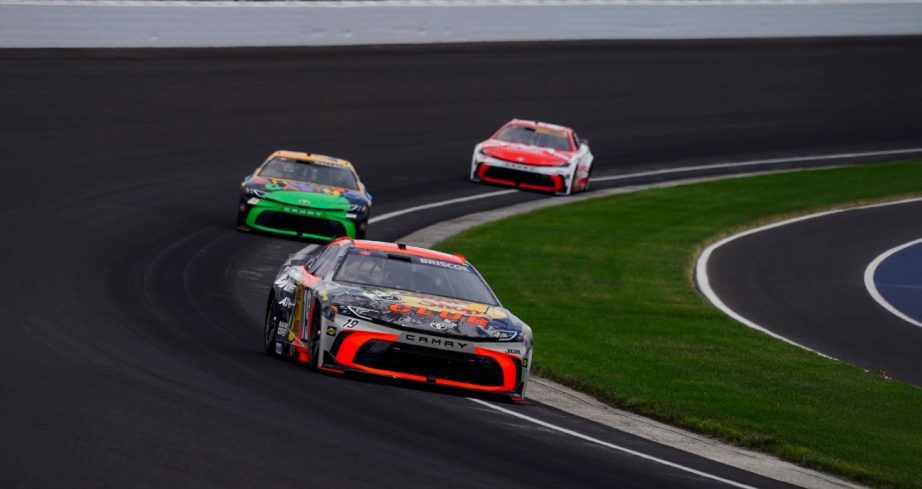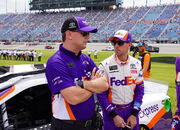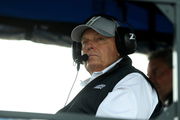
Imago
Matt Wishart | For NASCAR Digital Media

Imago
Matt Wishart | For NASCAR Digital Media
Money outweighs merit. NASCAR’s talent pipeline increasingly resembles a financial meritocracy, where deep-pocketed prospects gain fast access while gifted grassroots racers are sidelined. One NASCAR veteran driver flags that the sport’s dynamics have transformed the very essence of driver development. This issue isn’t just speculation; top insiders and drivers call it out as an existential risk to NASCAR’s integrity and its competitive future.
Watch What’s Trending Now!
The argument driven by the veteran is that today’s drivers will make a handful of worthwhile performances, but many may fade once the money dries up in grassroots racing. This critique echoes broader concerns: talent alone no longer guarantees a path forward in stock car racing.
ADVERTISEMENT
How NASCAR’s greedy sponsorship negates grassroots-level talent
Dirt track racing remains the birthplace of countless NASCAR stars, from legends like Kyle Larson and Christopher Bell to the lesser-known but ferocious short track aces. It’s characterized by grassroots competition, lower entry barriers, and pure mechanical skills. In comparison, NASCAR not only operates at a national commercial scale but also demands massive investment. Top-tier Cup rides reportedly cost upwards of $400k-600k per race and often require drivers to bring sponsorship themselves.
Seems like Joe Gibbs Racing and Stewart-Haas regularly prioritize drivers who can bring funding, even if less proven. As Freddie Kraft, Bubba Wallace’s spotter, puts it, “This sport right now is based on money over talent.” Chandler Smith, despite wins, acknowledges that without deep personal pockets or sponsorship, opportunities vanish, even with performance. And this occurs even more so on the grassroots racing level.
Speaking with Frontstretch, Randy LaJoie sounds his alarms on the way racing is these days. He says, “Well, I mean, it’s so different. I don’t even want to think about going there because I, there was things that I got taught that I’m probably not going to teach kids now. You know, it just, it wasn’t the right way, you know, but that’s the blueprint that I had. So, it’s hard. These kids nowadays are all computer kids. They’re, you know, they the reset button kids, pay to play, and you get a handful that are really good.”
ADVERTISEMENT
LaJoie confronts the uncomfortable truth: without early investment and financial support, many talented drivers fade after initial exposure. Dirt track vets last longer with local support, while aspiring NASCAR entrants race against the rising cost of entry and short-lived funds. Today’s drivers aspire early to NASCAR’s top divisions, often bypassing sustained grassroots development. Many legends began at local tracks out of passion, not promise, progressing incrementally.
The two-time Busch Series champion added, “You get a handful that are fun to watch. But the majority of them, you know, they’re here for a handful of years and then they’re gone. The money runs out, and you don’t ever see them. You they don’t go back to the short tracks. You know, so the short track guys, they seem pretty darn healthy.”
ADVERTISEMENT
Unless the balance shifts backward toward grassroots pathways, Randy fears NASCAR will continue courting only those who can pre-buy their way in, not those who learned how to race on merit. Moreover, Randy has experienced something like this. Dominant in the Busch Series, once upon a time, Dale Jr.’s debut in DEI, founded by Dale Sr., in the Busch Series ruined Randy’s dominance that lasted from 1996 to 1997. That’s the least of his concerns right now. The NASCAR Hall of Fame nominee has other concerns as well.
Top Stories
Dale Jr. Confronts Ex-FOX Broadcaster Over Hall of Fame Concerns, Urging Recognition for Deceased Veterans

“It’s Been a Sad Season”: Denny Hamlin’s Fiancée Jordan Fish Gathers Strength to Break Silence on Tragedy

Fans Demand Clarity as Denny Hamlin Ally Vanishes From NASCAR Spotlight

Rick Hendrick Forced to Take ‘Harsh Decisions’ on HMS Team After Awful 2025 Season

Fists Fly After Violent Brawl Breaks Out at Daytona Speedway, Leaving Racing Fans in Stitches

“Not ever make it to the big stage,” warns Randy LaJoie about grassroots-level racing
Randy LaJoie respects the incredible skill found in dirt track racing, midget racing, sprint cars, and Chili Bowl events, and he admires a few NASCAR drivers who made the transition from dirt to NASCAR. He notes, “Oh, correct. I mean, it starts in midgets. I mean, Kyle Larson, Christopher Bell, these guys, you know, ‘I’ve been to 15 Chili Bowls, and it is I’ve been to Indiana Week. That’s some of the best racing in the country, it’s midgets. When those midgets get to racing, it is incredible to watch.”
ADVERTISEMENT
When host Rick Benjamin notes that dirt track has expanded significantly over the last 15-20 years, especially across the Northeast, where fewer drivers used to advance into NASCAR or IndyCar. Today, talented drivers can make a living on dirt alone. Yet, despite this growth, dirt racing remains largely independent of mainstream national visibility; it lacks the broadcast infrastructure and brand appeal that NASCAR commands.
The 63-year-old goes on to add, “It was a good show, and they put on a good race. So, I’ve seen a lot of very good racing, you know, and like I said, sometimes they never they might not ever make it to the big stage, but they know how to race.” That reflects a view shaped by decades of working up through regional circuits into national series.
This sheer scale of NASCAR compared to grassroots dirt racing underscores LaJoie’s skepticism. NASCAR has cultivated nationwide appeal with a fixed schedule, major TV contract, and large venue events. Meanwhile, dirt track racing is decentralized; the United States has over 700 dirt oval tracks, largely local and community-oriented. LaJoie’s thoughts are rooted in the fact that the racing culture and professionalism remain distinct from NASCAR’s polished, corporate framework. Moreover, dirt drivers may be the most technically adept on clay, and fans relish the close-quarters drama, but Randy says that brilliance is celebrated within a parallel universe, popular in its corner of America but unlikely to share the NASCAR central stage.
ADVERTISEMENT
ADVERTISEMENT
ADVERTISEMENT
ADVERTISEMENT
